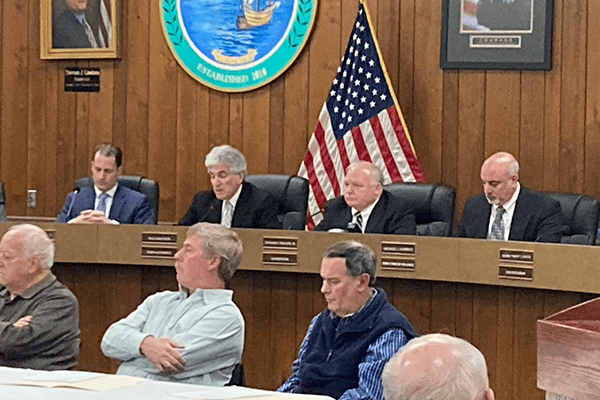|
RCBJ-Audible (Listen For Free)
|
Town Will Pay $235,000 To K’Hal Bnei Torah Of Mount Ivy To Resolve Controversy Over Application To Convert Single-Family House To Place of Worship
By Tina Traster
We’ll never know if the Town of Haverstraw Planning Board was on sound legal ground when it denied the application from K’Hal Bnei Torah of Mount Ivy to convert a single-family home into a house of worship at 62 Riverglen Drive in Thiells. We’ll also never know what actually motivated three of the five members of the Planning Board to vote “No” on a resolution recommending approval of the conversion.
Whatever their motivation was in denying the application, it resulted in a federal lawsuit against the Town, the Planning Board, and its members Glenn Widmer, Joseph Michalak, and Robert Sambrato, claiming they had violated the Religious Land Use and Institutionalized Persons Act of 2000 (RLUIPA).
“There was no rational basis for the planning board denying the application,” said Stein. “This was not winnable on the town level.”
Rather than litigate, the Town agreed to settle the multiple-pronged lawsuit for $235,000 to cover the applicant’s legal fees, and to approve the original plan with minor modifications.
“The settlement saves a tremendous amount of money; millions in attorney’s fees – ten or twenty times the settlement,” said Kenneth Pitcoff, an attorney from mdafp, the insurance company handling the claim. “The longer it went on, the worse it would have gotten.”
Pitcoff, along with town attorney Bill Stein and Town of Haverstraw Supervisor Howard Phillips told a standing-room-only chamber of 200 residents that the town had no chance of winning the suit.
“There was no rational basis for the planning board denying the application,” said Stein. “This was not winnable on the town level.”
The plan called for one-acre parcel at the far end of a 62-lot subdivision on 43 acres to be converted from a single-family residence into a house of worship. The applicant applied to the Planning Board to expand the home to 8,600 square feet and construct a parking lot that would encroach into an “unrecorded” conservation easement that surrounded the parcel on two sides. Because the conservation easement was never recorded in the public records, the Town had been treating it as a zoning restriction, similar to a setback requirement or a buffer, erasing the protections an easement would have had.
The applicant originally came to the board in January 2021 but it wasn’t until the Nov. 10th meeting that the issue drew national attention over an antisemitic outburst from a Haverstraw resident. In the lawsuit, attorney Ira Emanuel, who is representing the applicant, wrote “opposition to the influx of Orthodox Jews into Haverstraw permeated and overshadowed all discussions at the public hearing sessions. One outburst at an early session from a member of the public was so disgraceful that it made international news and drew condemnation from New York’s Governor Kathy Hochul.”
RLUIPA is a federal law that generally prohibits a governmental entity from applying a land use regulation in a manner that imposes a substantial burden on the religious exercise of a person or institution. It is both a sword and a shield, and a much used and much feared law that can topple a municipal government’s finances. The law provides for damages, injunctive relief, and requires the municipal government to pay the religious institutions’ legal fees if the municipal government is found to have violated the law, even without bad intent or malice.
“RLUIPA is upheld by the courts,” said Phillips. “It is the law. They are entitled to have a house of worship. We may disagree. We may not like it. But they have the law on their side.”
After the Planning Board denied K’Hal Bnei Torah’s application on Aug. 10, 2022 without discussion, the lawsuit was filed by Emanuel on November 15, 2022 in the Southern District of New York seeking $3 million dollars in damages against the Town, the Planning Board and each member of the Planning Board that voted “no”, $1 million dollars in punitive damages against each member of the Planning Board that voted “no” and payment of its legal fees. It also asked the court to order the Town to approve its plans as presented to the Planning Board. The Town’s Zoning Board had previously approved seven variances K’Hal Bnei Torah needed for its project.
Both the Town Board and the Planning Board voted unanimously on Monday at a special joint meeting to accept the settlement. The vote was taken before a three-hour hearing, although it was not clear why residents were given a chance to speak after the decision was a done deal.
But that didn’t stop residents from letting town leaders know how disappointed they were in the town’s decision to settle the case. They told public officials that caving into the RLUIPA lawsuit would set a precedent, asking over and over “where does this end?”
“The Town of Haverstraw caved to a threat by the congregation to have to pay money because of RLUIPA,” said Maddalena Harper. “This type of bullying needs to stop. It needs to stop now. The religious congregation came into a neighborhood with no houses of worship. They upset a neighborhood and it is not right for a municipality to harm the safety, health, and welfare of its residents.”
Many residents spoke of noise, garbage and parking nuisances that arise when residential homes are turned into public houses of worship.
Ilan Shulein, who moved to Haverstraw 43 years ago, said he lived next door to a house of worship for three years, suffering constantly with “the destruction of his property, high beams of light, parking in his front yard.”
Shulein, like others, repeatedly told the Board that calls to the Haverstraw and the Town’s Building Inspector, either went unheard or have not cured the disruptions to daily life for those who live near houses of worship.
Many residents urged the Town to keep fighting, not to be cowed by the threat of losing. They said over and over that by capitulating to this suit, it would invite more lawsuits in the future. Some thanked the Planning Board members for “their conviction” for voting against the proposal.
The Town never filed an answer or any motions challenging the complaint. Based on the advice of the attorney representing its insurance company, the advice of Town Attorney Stein, and the analysis of a law professor from George Washington University Law School, the Town and Planning Board agreed to the settlement. In part, the town agreed to settle because it only carries $1 million in liability coverage. Philips said the Town’s “Umbrella Policy” wouldn’t cover the claim.
“Why do we only have a policy for $1 million?” asked Garnerville resident Rachel Ammer. “How can we not be insured for this? We all know this won’t be the last one.”














